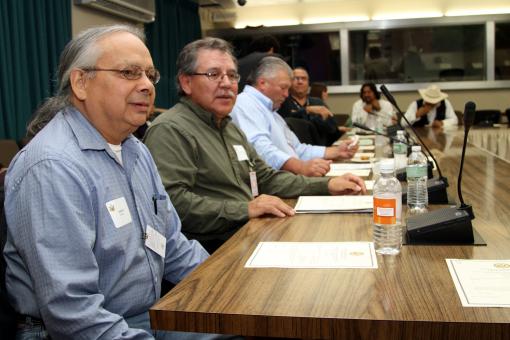
On Thursday, October 14, representatives from approximately twenty tribes held a consultation with officials from the White House, State Department, Department of the Interior, and other federal agencies to discuss the United States' review of the UN Declaration on the Rights of Indigenous Peoples. On the following day, representatives from federal departments and agencies met with non-governmental organizations interested in the Declaration. Staff from the Indian Law Resource Center attended both meetings to assist Indian nations with their efforts to encourage endorsement of the Declaration by the United States. None of the federal officials would say whether a decision could be expected soon; they did assure attendees that President Obama and Secretary Clinton are making indigenous issues a priority.
All of the indigenous leaders who spoke at the tribal consultation strongly urged the U.S. to adopt the Declaration. Leonard Masten, Yurok, explained that adoption of the Declaration is important for the United States to resume its role as an international leader in the area of human rights. Edward Alexander, Fort Yukon Gwich'in, explained how the principles in the Declaration could help build a better relationship for Alaska Natives with their state government. He expressed his community's concern about the failure of the State of Alaska to recognize the existence of indigenous nations in the state and about the Alaskan Native Claims Settlement Act, which transferred the ownership of their lands to for-profit corporations. Monty Bengochia, Bishop Paiute, urged the government to change its position. He and others commented on the need for respect for the land and water rights belonging to Native communities, including more extensive authority over sacred sites. While the Declaration is not binding law, it does express a commitment to honor the human rights of indigenous peoples and individuals, including their rights to land and natural resources.
At the meeting on Friday, most of the non-governmental organizations addressed the Declaration's international impact. Many of the speakers urged the United States to change its position because of the positive impact that the U.S. endorsement of the Declaration would have on the policies of multilateral development banks. Leonardo Crippa, staff attorney at the Center, expressed the Center's disappointment that the U.S. Treasury Department failed to incorporate the human rights concerns of indigenous peoples into its comments on the International Finance Corporation's proposed policies and performance standards, especially on Performance Standard 7 Indigenous Peoples. According to Treasury, because of the ongoing policy review on the Declaration, the U.S. couldn't properly address indigenous peoples' human rights concerns on development projects. Almost all of the organizations in attendance focused on the importance of the U.S. adopting the Declaration in order to regain its position as a leader on human rights.
Representatives from the Center explained the importance of the Declaration in addressing the issue of violence against Native women. Susan Masten, chairman of the Center's board, former chairman of the Yurok Tribe, and past President of NCAI, explained how the right to self-determination articulated in the Declaration is critical to her community's ability to protect its citizens from violence, particularly women and children. Her reservation is located in California, a Public Law 280 state. This means that the State of California has jurisdiction over the crimes that occur on the Yurok reservation. Unfortunately this means that most crimes committed in her community go unprosecuted. Three quarters of the homes lack electricity or telephone lines; even if a victim can reach a phone to call the state police, the police are located hours away. Violence in the community is also implicated by the problem of drug trafficking in the area. Members of Mexican drug cartels have taken advantage of the lawlessness on the Yurok reservation. Just recently, a multimillion dollar marijuana facility was discovered on the reservation. Only 20% of the drugs were recovered by law enforcement because the local tribal government had to wait for the state police.
Philomena Kebec, staff attorney at the Center, also addressed the issue of violence against Native women. Violence against indigenous women occurs where countries fail to protect the land rights of indigenous peoples. In the United States, several aspects of federal Indian law hobble the development of sustainable economic growth within reservation communities. These unfair laws include the lack of Fifth Amendment protections for lands owned by American Indians and Alaska Natives, the "plenary power" of Congress to take indigenous lands, and the inefficient trust system. These laws are a major contributor to the extreme poverty and high rates of unemployment endemic to most Native communities. This extreme poverty impedes the administration of justice and makes Native women and children vulnerable to domestic violence, rape, and trafficking. While the Declaration is not binding law, it provides an opportunity for the federal government to address those aspects of federal Indian law that are unfair, unconstitutional, and out of line with current human rights standards. The U.S. should also use the Declaration as a tool for international diplomacy to address the issue of violence against indigenous women in other countries.
The Center, with financial assistance from Connect U.S. Fund, provided travel stipends for many of the Indian leaders who attended. We also held strategy sessions with Indian leaders before the tribal consultation and with environmental and human rights groups before the NGO consultation. We continue to be available to tribes and other groups who would like more information about the Declaration or the U.S. review of its position.
